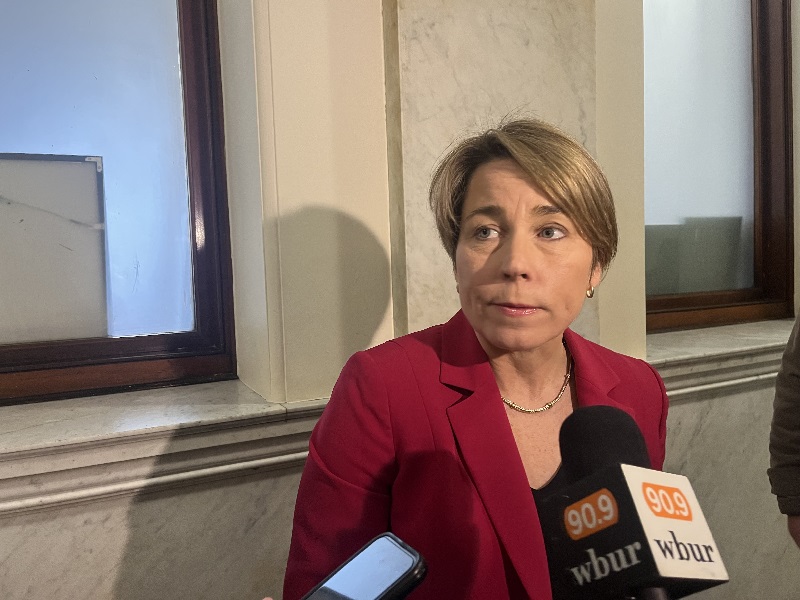latest
Hundreds of thousands in Massachusetts facing end to elevated food aid

By Sam Drysdale
FEB. 14, 2023…..Residents all over Massachusetts are scheduled to absorb a significant decrease in food assistance aid in just over two weeks, with more than 630,000 households facing a loss of about a third of what they have received in SNAP benefits over the past two years.
As low-income families and individuals who rely on Supplemental Nutrition Assistance Program (SNAP) to put food on the table and make ends meet prepare for the reduction, the state Legislature has before them a proposal to continue, at least in part, the pandemic-era emergency SNAP allotments. But with the federal declaration that assistance tied to COVID-19 will be phased out through the spring, the state has before it an aid cliff and slowing revenue growth to fill those gaps after several years of elevated spending.
Massachusetts residents have received additional federal SNAP dollars to help combat the economic impacts of the COVID-19 pandemic since March 2020. These extra payments were authorized by the first big federal pandemic package, at the time providing extra funds to about 60 percent of Massachusetts families, said Victoria Negus of the Massachusetts Law Reform Institute.
In 2021, the Biden administration updated the policy guaranteeing all SNAP households at least $95 in extra funds. On average, the SNAP emergency allotment has added an additional $151 to a household’s normal monthly benefit of $335 in Massachusetts, according to the Department of Transitional Assistance.
Around 630,000 households in Massachusetts have been receiving these extra benefits, which account for approximately $90 million in federal nutrition dollars flowing into the state each month, Negus said.
But, a year-end package approved by Congress in December disconnected the extra SNAP benefits from the end of the federal public health emergency, meaning the final federal payments are authorized for February 2023, three months before the federal public health emergency will come to a close in May.
Massachusetts issues these payments on the second business day of the month, so the final payment that Massachusetts households will receive with the extra federal dollars is coming up on March 2.
“The reality of these boosted payments during the pandemic is that SNAP has been able to meet more of a family’s food costs in a month. It’s really driven down food insecurity and increased the ability of families to make the healthiest choices for them, because they have had the dollars to do so,” Negus said. “Some demographics will feel the impact of the cliff to a greater degree than other families will.”
For around 200,000 households on SNAP that have no income, losing the average $97 per month to their normal benefit of $396 per month represents a 19.7 percent decrease in the amount they’ll have to spend on groceries.
For households with earned income, around 117,500 on SNAP in the state, their normal average benefit of $365 was boosted with an additional average $278 per month for the past two years. The end of the extra payments will mean a 43 percent decrease in their benefits.
Families with children under 5 years old had an average SNAP emergency allotment of $221 to add to a $586 normal monthly benefit, households with a member over 60 years old received on average an extra $132 to their $252 in monthly allowance, and homeless individuals and families got an extra $118 on average to their monthly $283 in normal monthly SNAP, according to the DTA.
“I heard from a mom, she has a family of four, a teen with Down syndrome and a disabled husband. She said, ‘This change will result in less healthy foods, a lower thermostat temperature and losing vital therapies for our youngest son along with a strain on utilities paid,'” Negus said.
To ease the transition from elevated aid levels, Gov. Maura Healey proposed a supplemental budget on Jan. 30 allocating $130 million to provide SNAP recipients with 40 percent of their previously enhanced allotment for another three months, which her office dubbed an “offramp” to the end of expanded benefits.
The governor’s bill would fund the $130 million with “repurposed enhanced federal Medicaid reimbursements, resulting in an approximately net $0 cost to the Commonwealth,” her office said.
Massachusetts Taxpayers Association President Doug Howgate said the governor’s approach is a “good balance” of meeting the needs of low-income families and understanding the limits of the state budget.
“You want to provide some certainty, some predictability to families who are going to be dealing with a change in this federal benefit,” Howgate said. “At the same time, also understanding that the SNAP program, historically speaking, has been something that we in the state/federal partnership, rely on the federal government for. And we need to be mindful as we think about our state investments in vital areas like food security, picking up the federal SNAP program, it is not something that we can probably accommodate in our budget.”
With a roughly $90 million price tag for the extra SNAP funds each month, the yearly total of federal dollars coming into Massachusetts for the emergency relief is about $1.08 billion. If the state wanted to continue the program on its own, it would represent a major new commitment and require other changes in the state budget.
The federal payments have always been “temporary,” but Negus said the short time between the declaration that the extra funds are being phased out and the last enhanced check will leave families scrambling.
“Congress cut short these payments earlier than everybody — earlier than Massachusetts, certainly, was expecting,” she said. “Having those three extra months of boosted allotments, even at the 40 percent rate that was proposed, will give families time they need to save and make case changes to maximize federal SNAP benefits.”
SNAP benefit amounts are tied to factors such as income, housing or shelter costs, child care, and if you have children, a disability or someone in your household over 60 years old, Negus said. Since everyone on SNAP has been receiving enhanced payments, many recipients have not updated their information, meaning they may be able to receive more than the amount they were getting in 2020 if their life circumstances have changed.
“Now that we have this really shortened time period, it’s much harder for everybody to be able to do that from an administrative standpoint,” she said. “Plus, the governor’s supplemental budget is critical as families need more food dollars to deal with the high cost of food right now.”
The budget was referred to the House’s temporary Ways and Means Committee on Jan. 31. With no movement on the topic in the Legislature in two weeks, Negus said she is hopeful that lawmakers will pass the governor’s supplemental budget before March 2 when the extra federal aid ends.
“I think that our Legislature understands economic realities facing low-income families across the commonwealth,” she said. “I think folks really understand the urgency of making sure families can put food on the table, and the value of these extra dollars.”
Meanwhile, other benefits are also coming to a cliff with the end of federal aid, including the free school meals program and expanded Medicaid.
Healey’s supplemental budget also includes $65 million to ensure a universal school meals program remains afloat through the end of the academic year. This program was also started by the federal government at the start of the pandemic, and the state extended free school meals for $110 million in the state budget last year, though it wasn’t enough to keep the program running through June.
State lawmakers have proposed legislation to continue this program permanently through state funds as the federal pandemic boosts end. But lawmakers and the governor have a lot of new spending plans as the new session gets underway, including dramatically expanding early childhood education and investing in infrastructure projects around the state.
When asked Monday if the state can afford to pick up the tab on dropping federal pandemic relief programs, Healey called her supplemental budget a step to “deal with some of the realities” of the “expiration of the federal public health emergency.” She also said she spoke with the U.S. Health and Human Services Secretary Xavier Becerra about this issue on her recent trip to Washington, D.C.
“It’s why you saw us put forward a request for funding for SNAP for food assistance, as well as for meals for kids in schools. So, you know, with the close of that program, it becomes important that we find a way to work to make sure that people here, especially people who are really vulnerable, are taken care of,” she said. “We’ve got a lot of work to do. But, again, this is why conversation with our federal partners is really important.”
-

 Community7 years ago
Community7 years agoNational Shrine of La Salette Festival of Lights 2017 set to begin
-

 Community6 years ago
Community6 years agoMassachusetts State Police looking for good home for retired dogs
-

 Crime6 years ago
Crime6 years agoFall River ranked most dangerous city in Massachusetts according to report
-

 latest7 years ago
latest7 years agoDurfee student allegedly overdoses on marijuana
-

 Community6 years ago
Community6 years agoVideo of Fall River Police goes viral
-

 Causes6 years ago
Causes6 years agoMissing Fall River woman found deceased
-

 Crime6 years ago
Crime6 years agoFall River Police add names to most wanted list
-

 Causes6 years ago
Causes6 years agoFall River teenager reported missing has been found




Ryan Dunn
February 14, 2023 at 6:52 pm
What irks me, is that we’ve been hit with such bad inflation, yet they determine to not only terminate the elevated food aid, but also decrease the monthly aid I’ve received before this problem. On top of everything else, they also raise all prices on food, yet the gross income limit stays same. Absolute bollocks if you ask me.
Fed Up
February 14, 2023 at 8:10 pm
The migrants a.k.a illegal aliens are putting a strain on the resources while Massachusetts citizens who paid years into the system are put on the backburner. We can’t take care of everyone sorry , Except Maura Healy and her $300K a year we have money for that
Ryan Dunn
February 15, 2023 at 9:01 am
Damn these Stalinists. Its GD Holodomor out here this term.
paula tatro
February 15, 2023 at 7:43 am
as a senior citizen on SS my snap amt will decrease to $23 a month.can’t buy much on that.